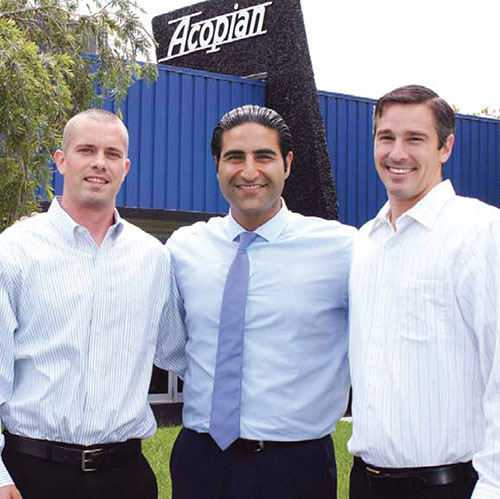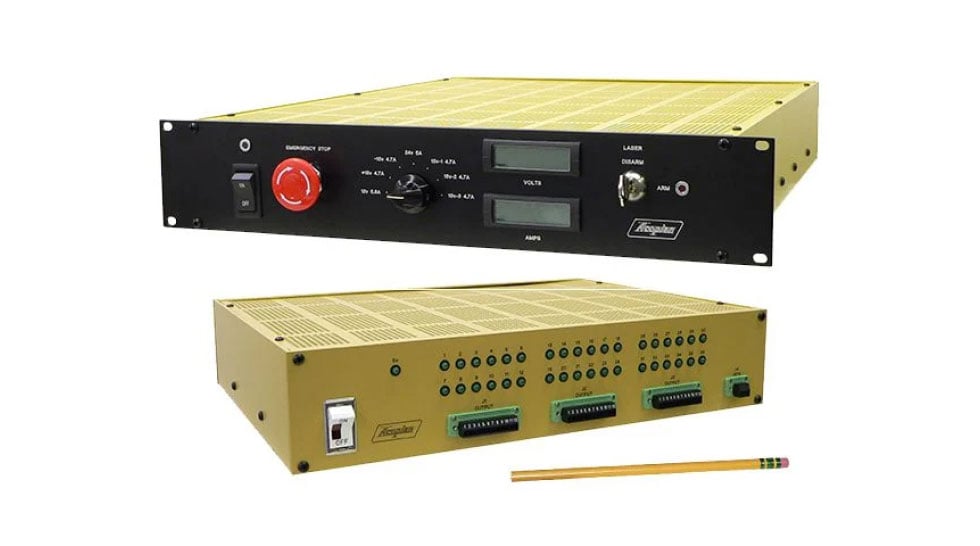Manufacturer Acopian never wavered on its made–in–USA stance
By Ken Datzman

Acopian Technical Co. designs and manufactures power supplies that make electrical systems work. Most of the manufacturing is performed at its 45,000–square–foot Melbourne plant. The late businessman and philanthropist Sarkis Acopian founded the firm on the East Coast and expanded to Melbourne in 1971. All Acopian products are American–made. The business is led by the second and third generations of the family. From left: Ezra Acopian, purchasing manager; Alex Karapetian, director of sales and marketing; and Jeff Calhoun, quality liaison.
Reprinted with permission from Brevard Business News -- Easton, PA -- Though the hemorrhaging has slowed in the last two years, the U.S. trade deficit with China either eliminated or displaced more than 2.7 million American jobs between 2001 and 2011. It was a brutal period for U.S. workers. All 50 states lost jobs to China.
More than 2.1 million, or 76.9 percent of the jobs eliminated or displaced were tied to the manufacturing of computers and other advanced technology products.
The in–depth research is detailed in a paper by the Economic Policy Institute in Washington, D.C., which spells out the financial impact of global outsourcing.
The states with the biggest net losses, in terms of jobs, were California, New York, Illinois, North Carolina, Florida, Pennsylvania, Ohio, Massachusetts, and Georgia.
Hard–hit sectors in manufacturing, other than computer and electronic parts, include apparel and accessories, textiles, fabricated metal products, plastic and rubber products, and motor vehicles and parts.
During that 10–year period, businesses of all sizes rushed to outsource their work, not only to China but also to a host of other labor–cheap countries far away. Organizations such as the Occupational Safety and Health Administration and the Environmental Protection Agency, which help protect workers in America, do not exist in foreign lands.
“We could have done that, too, but we chose not to,” said Alex Karapetian, director of sales and marketing for Acopian Technical Co., a family owned and operated business headquartered in Easton, Penn., with manufacturing operations in Melbourne.
“As a company, we won’t compromise our principles. Our products are 100 percent American–made. We’re proud of that. We’ve been manufacturing in the U.S. for more than a half–century and we will continue to do so.”
Acopian — which sells to government, industrial, and commercial customers — designs and manufactures power supplies that make electrical systems work. Most of the manufacturing takes place at its 45,000–square–foot Melbourne plant. An additional 20,000–square–foot storage facility is nearby.
These power supplies operate inside computers, communications equipment, lighting systems, and other critical applications.
“We offer 30,000 different voltages at different amperages,” said Karapetian, adding that Acopian does not discontinue product lines. “That is huge and the customers love it. They know they can count on us for their supplies.”
Closely held Acopian, with a worldwide customer base, has been designing and manufacturing power supplies since the late 1950s. The company touts its fast shipping turnaround on orders — three days or sooner. “We’re known for that customer promise.”
Acopian’s client list includes some of the most visible brands in America and around the world, such as Raytheon, Harris Corp., Boeing, Rockwell Collins, General Electric, Walt Disney, NASA, Harvard University, Massachusetts Institute of Technology, and the Los Alamos National Laboratory.
The company, with roughly 150 employees at the two sites combined, built its Melbourne plant on West Nasa Boulevard in 1971. Many of the associates who work at the local facility have been employed there for three decades, or more. Employee longevity is also the same at the Pennsylvania location, said Karapetian, whose company holds the ISO 9001 certification. “We have a very dedicated work force and little turnover.”
Acopian in Melbourne is one of the longstanding businesses in what has grown into a high–tech corridor over the years that now includes Northrop Grumman, Harris Corp., General Electric, Rockwell Collins, and Symetrics Industries.
In the early 1970s, developers were trying to attract businesses to that part of Melbourne, and they ran advertisements in publications. The Sarkis Acopian family came from Pennsylvania and looked at the area, which showcased large tracts of undeveloped land close to Melbourne International Airport.
“Business was growing and Sarkis thought it was a great place to expand and set up a manufacturing facility,” said Karapetian. “There was a lot of land available to build on and the area was beautiful. We wanted to preserve much of the land, too, and that is one of the reasons why we purchased additional acreage for our Melbourne facility.”
The company’s wooded Melbourne campus is across the street from Northrop Grumman. “A lot of our customers are our neighbors,” he said. The local Northrop Grumman facility recently placed an order with Acopian and requested UPS ground shipping.
“I called and asked if they really wanted us to ship their power–supply order. I told them we would be more than happy to personally deliver it because we are just across the street from them. ‘Oh, you are in the building with the blue roof and the American flag.’ We’ve kept a low profile in the community,” he said.
Acopian, while on the cutting–edge of technology and innovation, is often viewed as an old–school American business, one that still holds strongly to its heritage and the principles upon which the company was founded.
Conservatively run with no ambition to overextend itself by moving beyond its market niche, Acopian, positioned in a competitive global industry, has thrived by sticking to the core principles established by its founder, the late businessman and inventor Sarkis Acopian.
He invented the solar radio in the 1950s. The radio used light as the source of energy. “Sarkis was definitely ‘green’ before it was cool,” said Karapetian.
The Acopian Solar Radio was advertised as “revolutionary — no batteries or outside electrical plug–ins.” It’s believed to be the first solar radio manufactured for sale to the public. “Obviously, that wasn’t going to make a lot of money back then, but Sarkis was ahead of his time.”
An Armenian, Sarkis Acopian came to America and to Easton in 1942 to study mechanical engineering at Lafayette College. His schooling was interrupted with U.S. Army service during World War II. Sarkis Acopian finished his engineering degree in 1951. The family has a long history with Lafayette College. Generations have earned their degrees from the Lehigh Valley institution.
Sarkis Acopian was a self–effacing man who passionately believed in supporting the community quietly. He made numerous donations to local, national, and international causes that have included the Acopian Engineering Center at Lafayette College.
Locally, he endowed the environmental education program at Florida Institute of Technology. It’s called the Sarkis Acopian Endowed Chair in Environmental Education.
His philanthropic efforts in Pennsylvania include the Acopian Center for Ornithology at Muhlenberg College, the Acopian Center for Conservation Learning at Hawk Mountain Sanctuary, and the Nature Conservancy’s Acopian Big Turtle Preserve.
In 1995, he purchased and donated a Spanish colonial mansion to the Embassy of the Republic of Armenia in Ottawa, Canada. And Sarkis Acopian helped fund the construction of two churches, including one in Charlotte, N.C., built in memory of his mother, Dr. Arax Acopian.
“Giving back was extremely important to him and it is to all of us,” said Karapetian. “Whether it was education or the environment or another cause, he wanted to help make the world a better place. And he did it without pomp and circumstance. Sarkis did it because he cared. Some of the charitable contributions he made to organiztions were made anonymously.”
Sarkis Acopian showed his great sense of gratitude to his adopted country by being the largest individual donor to the World War II Memorial in Washington, D.C. This generational contribution was unknown to the public until after he passed away in 2007. Pennsylvania Congressman Charles Dent, in a speech before the U.S. House of Representatives commemorating Sarkis Acopian’s life, recounted the story behind the WW II Memorial.
In return for his contribution, Sarkis Acopian only asked for a seat at the dedication ceremony. But because of very limited seating at the event, he decided not to attend. He gave up his seat so that another veteran could be there.
Sarkis Acopian’s charitable spirit and the business philosophy he honed lives on today through the second– and third–generation leadership of the family.
The emphasis on high–quality USA–made products and personalized customer service head the list that he penned decades ago as a guiding light for his firm.
“Sarkis founded this company on the basic principles of quality, reliability, fast shipping, and unsurpassed customer service,” said Karapetian, who is a graduate of Lafayette College and has an MBA degree from New York University. “We strive every day to live up to those guiding principles.”
On the customer–service front, for example, Acopian does not use an automated software–answering system, and clients embrace the direct connection.
“When a customer calls, he or she does not press ‘extension 1’ for assistance and then gets redirected somewhere overseas where ‘Jacob’ wants to help the customer. That is not done at this business.” Karapetian added, “Family businesses evolve and grow and sometimes they lose that personal touch, that connection with the customer. We have not changed from our core principles.”
Karapetian, who once interned at the office of Rep. Pat Toomey of Pennsylvania and worked on Capitol Hill raising awareness for Armenian causes, joined the company in 2006.
The current family management tree also includes Greg Acopian, company president; Jeff Acopian, vice president; Ezra Acopian, purchasing manager; and Jeff Calhoun, quality liaison.
Greg Acopian and Jeff Acopian, second generation family members, are based in Pennsylvania. The other team members work at the Melbourne plant.
One of the company’s components even powered a New Year’s Day ball–drop countdown in Times Square, an event where the system’s reliability is critical.
“We ‘burn–in’ our power supplies for eight hours. When they ship out of our facility, we know we have turned out a high–quality, reliable product for the customer,” said Karapetian. The purpose of the hours–long burn–in process is to weed out underperfomers.
In June, Acopian received the “4–Star Supplier Excellence Award” for 2014 from Raytheon’s Integrated Defense Systems business. Supplier partners that support the IDS business were recognized for outstanding performance at Raytheon’s facility in Andover, Mass.
Award candidates were judged on specific criteria, including overall quality, on–time delivery, process–improvement initiatives, innovation, and safety standards. This award places Acopian among the top 0.5 percent of the 10,000 Raytheon suppliers.
Also this year, Acopian was presented with the inaugural ECN Impact Award in the category of “Power Supplies and Conditioning” for its “1U” 759 watt AC–DC Power Supply family, which targets a broad market range including original equipment manufacturers and laboratory applications. The event was held in Las Vegas.
Karapetian represented the company at both award gatherings.
He said Acopian is “on track to have a good year. We have some new products coming out. We’ve won some big awards within our industry and we’re poised to grow.”
Acopian is among an elite group of small businesses in America that have survived into the third generation. Only about 30 percent of family firms make the cut to the second generation, and only 12 percent are viable into the third generation, according to the Family Business Institute.
“If everyone in a family business has different interests, that business is going to suffer. At Acopian, we share the same interests. We are all working together to achieve one common goal — to make this company better and better. That will drive our future success as a company,” said Karapetian.


 Made In The USA
Made In The USA

